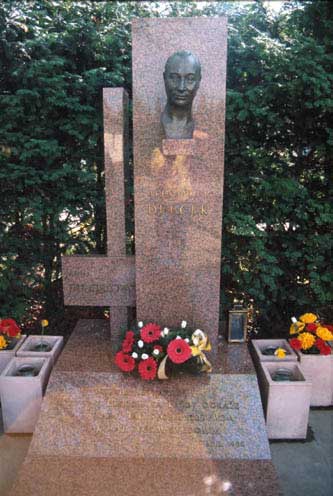|
|
|
Alexander Dubcek |
|
|
|
Alexander Dubcek |
| Born
November 27, 1921 in Uhrovec, Czechoslovakia (now in the Slovak Republic),
to communist parents, Dubcek spent his youth first in Slovakia, then in
Kirghizia (now Kyrgystan), where his father moved the family in response
to the Soviet Communist Party's call for communists to help build "socialism"
in the Soviet Union. In 1938 the family moved back to Slovakia, where
Dubcek joined the illegal Communist Party of Czechoslovakia. During the
Nazi occupation of Czechoslovakia, Dubcek fought the Germans both
through guerrilla activities of the underground resistance and as part
of the Slovak National Uprising. He rose steadily through the ranks of
the Communist Party, achieving membership on the Central Committee of
the Slovak Communist Party in 1951. The party sent him to Moscow
Political College in 1955, where he graduated with honors in 1958. By
1962, he was a member of the Slovak and Czechoslovak Communist parties
and a full member of the Central Committee of the Czechoslovak Communist
Party.
During this period the party faced challenges both internally and externally: the economy was in serious disarray, the Slovak communists chafed at Prague centralism, and de-Stalinization caused unrest. Many party intellectuals hoped for reform. In October 1967, Dubcek and his reformer colleagues took action, calling Communist Party First Secretary Novotny's policies into question at a Central Committee Meeting. Dubcek became first secretary of the Czechoslovak Communist Party on January 5, 1968, when several factors -- Brezhnev's failure to support Novotny in December 1967, fissures within the party, and a growing coalition of party members allied against Novotny -- coalesced. During the resulting "Prague Spring" (March-August 1968), Dubcek attempted to reform the Communist Party and allow "socialism with a human face." Under Dubcek, the Prague Spring transformed the lives and social relations among all Czechs, party and non-party members alike. The Prague Spring, however, caused great concern among Eastern bloc nations and the U.S.S.R. Dubcek attempted to reassure the Soviets that they were still good communists friendly to Moscow, while arguing that the reforms were an internal matter. After a series of meetings and visits of Soviet officials to Czechoslovakia, the Prague Spring ended on August 21, when Soviet tanks rolled into Prague. Dubcek and other reformist top communists were seized, flown to Moscow and forced to surrender to Soviet demands. People in the streets of Czechoslovakia passively resisted tanks with placards and slogans, changing the names of many villages to Dubcekovo ("belonging to Dubcek") to show their support for Dubcek and confuse the invading troops. Dubcek was returned to Prague on August 27 and gave a speech, breaking into tears as he told his people that much of what they had achieved was lost. After April 1969 Dubcek was demoted, expelled from the party and eventually sent into internal exile as a forestry official. He could talk to no one outside his family without permission. In November 1989, as part of the country's Velvet Revolution, he spoke at a rally in Bratislava and later stood on the balcony overlooking Wenceslas Square with newly elected President Vaclav Havel while huge crowds cheered. Dubcek was unanimously elected chairman of the Federal Assembly on December 28, 1989, and re-elected in 1990. Dubcek died at age 70 on November 7, 1992, of injuries sustained in a car crash.
|
|
 |
|
|
|
Bratislava - Slávicie údolie (Lark valley) |
|
Photo Frantisek Zboray |